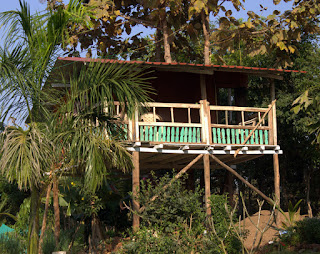Posts
Social Evangelism
- Get link
- X
- Other Apps

Agro & Edu Tourism Y uva Parivartan’s Model Farm and Training center is located at Sonale village, Wada, district Palghar, the place where I enjoyed a cheerful stay, as it is on the forest headway and scenic lush green mountains make your tour enjoyable specially, in monsoon and winter. Meandering Vaitarna river encircle valleys, and surrounding villages, finally ends into Arabian seas of Mumbai Island. It was a memorable stay, I ever remember. There is many income generating projects such as poultry, goat farming, Goshala. The Projects aims to empower marginalized farmers, women’s groups helping livelihood through innovative intervention of long and short-t...
Clean and Green Ghavare kond village
- Get link
- X
- Other Apps

Cleanliness is next to Godliness, is a very old adage, and millions of people knew that cleanliness and hygiene prevents host of health and social problems but people do not take initiative for what they see around them. Today Government initiated a nation wide campaign to make the India green and clean, in-response to the campaign Ghavarekond proved its unity and integrity to make their village green and clean. Swades Foundation had stepped into Ghavarekond Jangamwadi in 2007, the first meeting held with villagers and water and sanitation project gave a hamlet a new outlook and hope as the villagers were deprived of the very basic need i.e. water and sanitation. The journey of the change take a lead and integrity and unity among villagers took a turn that they volunteered a step further for Sw...
Save Vulture
- Get link
- X
- Other Apps

Save vultures Vultures are birds of prey that live in communities and anthropogenic environments and are generally very dependent on human activities. The Vulture underwent dramatic declines in India and other Asian countries during the 1990s and 2000s according to the experts. In the case of vulture decline, the main cause is the use of diclofenac as a pain-killer for livestock. Vulture consumed diclofenac pestered carcasses and died. Today there is a ban using veterinary diclofenac but disappearing Vulture indicates a suspect use of the drug in villages by vaterian doctor. Decline in vulture population increases the number of wild dogs, and they carry d...
MOVING HOUSE: Migrant Landless Katkari
- Get link
- X
- Other Apps

Chronological index shows that Katkari tribes are aborigines of India . Following the British invasion katkari habitation in forest restricted. Katkari’s livelihood had dependent on forest sources, after imposing ban they reduced to bonded labor gradually. Even today, they live an insignificant life. The British had defeated Pune’s last Maratha Empire in 1818, and their sovereignty established over Indian land Katkari’s main source of livelihood was to make katha from the tree of Acacia Catechu. Before invasion forestland were open to the people. British’ interest was to rule and exploit the resources so they restricted the people who were dependent on forestland, among those katkari tribe was the worst affected as forest was their main source of livelihood. In some places, as vatandari , Landlords had owned a chunk of forestland; some took the land on lease and collaborated with British. British imposed taxes on forest resou...